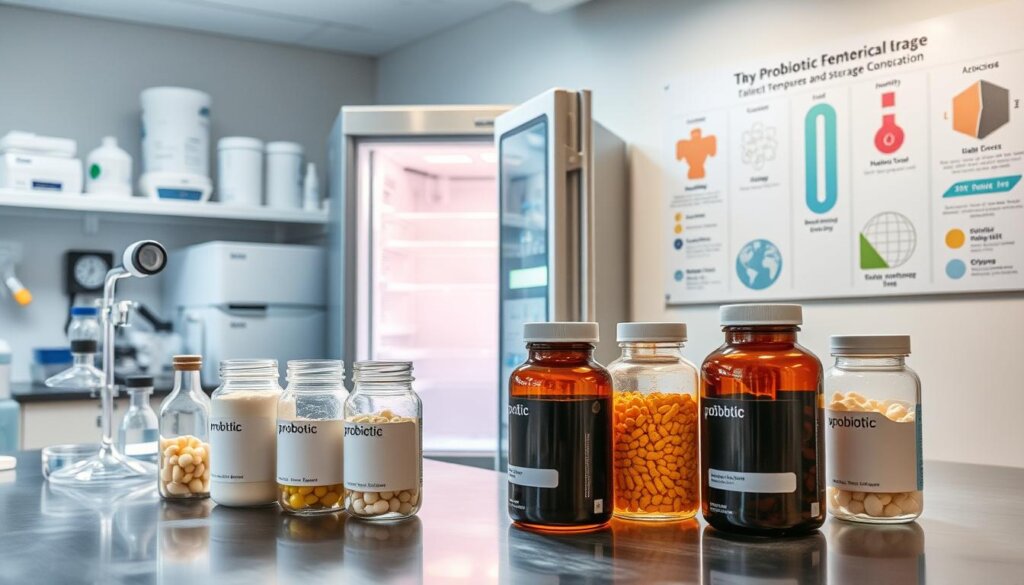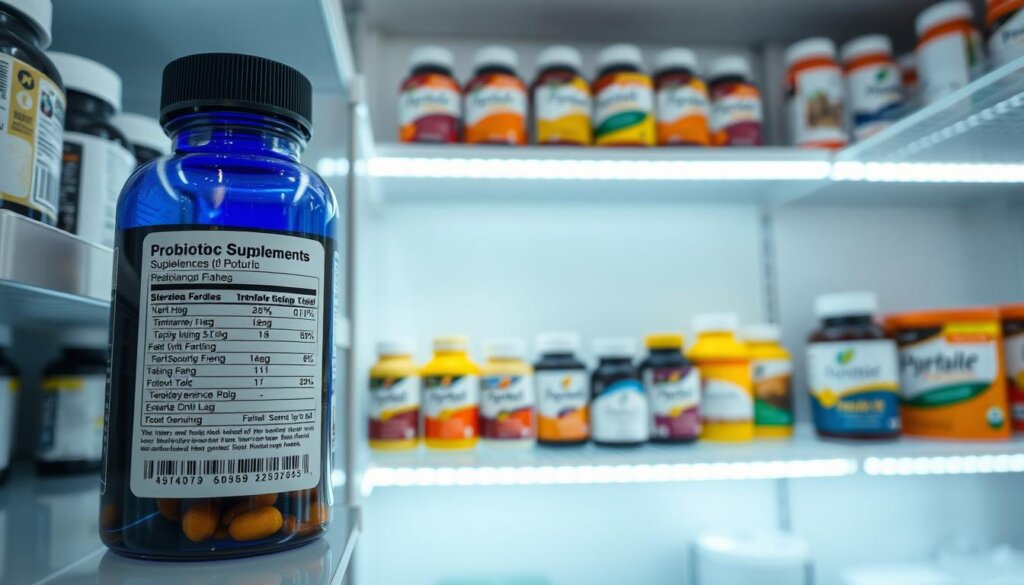How to Store Probiotics Properly: Wellness Group Guide
Are you unknowingly killing your probiotics before they even reach your gut? These live microorganisms play a vital role in supporting digestive health, immune function, and nutrient absorption. Yet many people overlook one critical factor: their survival depends entirely on how they’re cared for before consumption.
Unlike standard vitamins or medications, probiotics are delicate. Exposure to heat, humidity, or light can drastically reduce their potency. This means even high-quality supplements may lose their health benefits if stored incorrectly. For instance, does your probiotic bottle belong in the fridge or on the shelf? The answer isn’t always obvious.
Wellness Group’s experts emphasize that proper care ensures these friendly bacteria remain active until expiration. Factors like packaging design, room temperature fluctuations in Malaysian homes, and airtight seals all influence effectiveness. With over 70% of users unaware of storage best practices, misinformation could be undermining their wellness goals.
Key Takeaways
- Live probiotics require specific conditions to stay active and effective.
- Temperature and humidity are the biggest threats to their shelf life.
- Refrigeration isn’t always necessary—check product labels first.
- Air-tight packaging protects against moisture and oxygen damage.
- Consult Wellness Group via WhatsApp (+60123822655) for personalized advice.
Whether you’re new to probiotics or a long-time user, this guide clarifies the science behind keeping them potent. Discover simple strategies to protect your investment and maximize their impact on your well-being.
Understanding Probiotics and Their Benefits
Imagine your body as a bustling city where trillions of tiny workers keep everything running smoothly. Among these workers are live microorganisms called probiotics – nature’s helpers for maintaining balance in your digestive ecosystem.
What Are Probiotics?
These beneficial bacteria mirror the natural microbes found in your gut. Think of them as reinforcements for your body’s existing team. While often linked to yogurt, they’re also available in supplements designed to survive stomach acid and reach their destination alive.
Health Benefits and Role in Gut Health
A thriving gut microbiome does more than break down food. Studies show these microorganisms help regulate immunity and may reduce inflammation. For example, specific strains can ease digestive discomfort caused by antibiotics or stress-related imbalances.
Regular intake supports more than just digestion. Some research suggests certain bacteria strains might improve cholesterol absorption and strengthen the body’s defenses. The key lies in choosing products with strains that match your wellness needs.
Your gut houses over 1,000 species of organisms, each playing unique roles. When this community stays balanced, it creates a foundation for overall health. That’s why maintaining microbial diversity through probiotics matters – it’s like tending a garden where every plant contributes to the landscape.
Factors Influencing Probiotic Storage
The journey from factory to your gut is a survival challenge for live bacteria. Environmental factors determine whether these microorganisms arrive ready to work or lose potency along the way. Three key elements shape their fate during storage.

Temperature and Humidity Considerations
Heat acts like a silent thief, stealing vitality from delicate strains. Most bacteria thrive below 70°F (21°C) – a critical threshold for maintaining colony counts. In Malaysia’s tropical climate, room temperatures often exceed this limit, creating hidden risks.
Humidity poses another stealthy threat. Freeze-dried cultures remain dormant until moisture wakes them prematurely. With ideal relative humidity under 20%, many homes here battle dampness that could activate strains before consumption. Air-conditioned spaces help, but consistent monitoring matters most.
Packaging, Shelf Life, and Strain Sensitivity
Not all microorganisms share the same resilience. Lactobacillus varieties often wilt in heat, while Bacillus species endure warmer conditions. Manufacturers combat these differences through specialized packaging – moisture-proof barriers and oxygen absorbers become their armor.
Shelf life depends on this protective engineering. Blister packs with aluminum coatings outperform plastic bottles in humid environments. Some products even include desiccants to control internal moisture levels during storage.
Smart choices begin with understanding labels. Heat-resistant strains suit non-refrigerated settings, while others demand cooler conditions. Always check expiration dates – viable counts diminish faster in suboptimal environments.
How to Store Probiotics Properly
Your bacterial allies remain battle-ready only when stored correctly. Manufacturers design products differently—some thrive in cool environments, while others withstand warmer conditions. The secret lies in reading labels like a treasure map to microbial vitality.
Cold Storage Champions
Delicate strains like Lactobacillus often require refrigeration to stay dormant until consumption. These supplements usually live in pharmacy chillers or arrive with ice packs. Cold slows bacterial metabolism, preserving colony counts closer to expiration dates.
“Refrigeration isn’t just about temperature—it’s a lifeline for heat-sensitive strains,”
notes Wellness Group’s microbiology team. Check labels for phrases like “keep refrigerated” or “store cold” to identify these products.
Climate-Resistant Formulations
Modern freeze-dried options use triple-layer packaging to block humidity and oxygen. Their hardy Bacillus subtilis strains survive Malaysian room temperatures for months. Brands often mark these as “shelf-stable” or “no refrigeration needed.”
Blister packs with aluminum seals outperform plastic bottles in tropical climates. Store them away from stoves or sunlight—consistent 25°C environments help maintain potency. When in doubt, follow printed guidelines like a recipe for microbial success.
Practical Tips for Maximizing Probiotic Shelf Life
Did you know your supplement routine could be sabotaging itself? Proper handling extends the lifespan of beneficial bacteria. Three simple practices keep microbial allies active and ready for action.

Decoding Labels and Expiration Markers
Manufacturers design products with specific needs. The label acts as a roadmap – refrigeration symbols or “use by” dates determine success. One study found 40% of users ignore storage instructions, risking potency loss.
| Storage Location | Protection Level | Recommended For |
|---|---|---|
| Original blister pack | High | Heat-sensitive strains |
| Plastic bottle | Moderate | Climate-resistant formulas |
| Medicine cabinet | Low | Short-term storage only |
Packaging: Your First Line of Defense
Blister packs create individual armor for capsules. Each sealed compartment blocks humidity better than bottle storage. Transferring pills exposes them to oxygen – the enemy of freeze-dried cultures.
Environmental Control Strategies
Malaysian bathrooms average 70% humidity – a death sentence for unprotected products. Store supplements in cool, dark drawers instead. Rotate stock based on expiration dates to maintain peak effectiveness.
“Consumers often treat probiotics like vitamins – that mistake costs them billions of viable CFUs monthly.”
Check labels quarterly for storage updates. Some formulas gain stability improvements over time. When in doubt, keep capsules chilled and sealed until consumption day.
Additional Considerations for Choosing and Storing Probiotics
Did you know your probiotic supplement might arrive weaker than advertised? A recent study found 85% of products contained fewer live cultures than their labels claimed. Shipping and storage mishaps often drain their potency before they reach you.
Understanding Packaging and Delivery Methods
Quality products use advanced safeguards. Look for triple-sealed blister packs or glass bottles with oxygen absorbers. These block humidity – the silent killer of freeze-dried cultures. Reputable brands often add 20-30% extra bacteria to offset shipping losses.
Consider this comparison when selecting:
| Feature | Supplements | Fermented Foods |
|---|---|---|
| Live culture count | Varies by storage | Naturally sustained |
| Climate resistance | Needs careful handling | Stable in fridge |
| Strain diversity | Targeted formulas | Natural mixtures |
Research shows fermented foods like kimchi and kefir often maintain more reliable microbe counts. Their natural acidity creates a protective environment for beneficial cultures.
Contacting Wellness Group for Expert Guidance
Struggling to decode expiration dates or storage symbols? Wellness Group’s specialists analyze product labels and shipping histories to recommend viable options. They’ve helped clients identify 12 climate-resistant formulas suitable for Malaysian homes last year alone.
“Third-party testing reports separate quality supplements from marketing hype – always request them,”
Reach their team via WhatsApp (+60123822655) weekdays 9:30 am-6:30 pm or Saturdays 10 am-5 pm. They provide personalized storage tips based on your home environment and health goals.
Conclusion
Protecting your microbial allies requires more than just popping a pill—it demands smart care from purchase to consumption. Keeping probiotics viable ensures they deliver full health benefits to your gut. Refrigeration needs vary by product, so always verify labels for temperature guidance.
Quality matters as much as storage. Reputable probiotic supplements maintain higher colony counts through advanced packaging and stability testing. Pairing these with fermented foods like kimchi or yogurt creates a synergistic effect—natural microorganisms thrive alongside supplemental strains.
Your gut ecosystem influences overall wellness, from immunity to nutrient absorption. Consistent practices preserve bacteria potency: avoid humidity, minimize light exposure, and respect expiration dates. Small adjustments make big differences in microbial survival rates.
Wellness Group’s experts offer tailored advice for Malaysian households. Reach them via WhatsApp (+60123822655) to optimize your regimen. With proper care, these tiny warriors become powerful allies in your health journey.
FAQ
Do all probiotics require refrigeration?
No. Certain strains, like Bacillus coagulans or shelf-stable Lactobacillus, survive at room temperature. Always check labels for storage instructions—brands like Culturelle or Renew Life often specify whether refrigeration is necessary.
Can probiotics lose potency if stored incorrectly?
Yes. Heat, moisture, or exposure to light can degrade live cultures. Products like Align Digestive Support or Garden of Life capsules may lose effectiveness if left in humid environments or high temperatures for extended periods.
How long do probiotics typically remain effective?
Most supplements retain potency until their expiration date when stored properly. For example, Florastor maintains stability for up to two years in sealed blister packs. Fermented foods like kimchi or kombucha have shorter shelf lives and often require refrigeration.
Are there signs that probiotics have gone bad?
Changes in odor, texture, or color may indicate spoilage—especially in dairy-based products like yogurt. For capsules, bloated packaging due to moisture exposure suggests compromised quality. Always discard expired or damaged items.
Does the delivery method affect storage needs?
Absolutely. Powdered probiotics, such as Seed DS-01 Daily Synbiotic, often need airtight containers to avoid clumping. Chewables or gummies, like SmartyPants Kids Probiotic, may melt if exposed to heat, requiring cool, dry storage.
Can I travel with probiotics without refrigeration?
Yes. Use insulated bags with ice packs for heat-sensitive strains. Brands like Hyperbiotics PRO-15 offer travel-friendly blister packs that protect against temperature fluctuations and humidity during trips.
How does Wellness Group assist with probiotic storage queries?
Their experts provide tailored advice via WhatsApp: +60123822655 during business hours (Monday-Friday 9:30 am–6:30 pm, Saturday 10 am–5 pm). They clarify storage guidelines for specific products, such as Visbiome or Dr. Mercola Complete Probiotics.

Khloe Tan
Khloe Tan is a Certified Nutritionist, Corporate Wellness Trainer, and Holistic Health Specialist with over 15 years of experience in the health and wellness industry. She has delivered more than 100 talks nationwide, inspiring and educating diverse audiences on nutrition, lifestyle, and sustainable wellness. Her work has positively impacted over 3,000 lives, and she continues to champion holistic approaches to well-being in both corporate and personal settings.
Feature Product
-
Hydrogen Water FIlter/Generator
H2zen Portable (White/ Blue)
RM2,600.00 Add to cart Buy NowRated 0 out of 5





